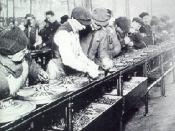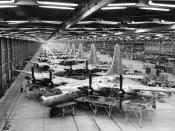Introduction
Antonio Gramsci called Fordism "an ultra-modern form of production and of working methods such as is offered by the most advanced American variety, the industry of Henry Ford" (G. Antonio, 1971: 280-81). Ford pioneered the modern model of mass production which bears his name, and which is often said to date from the development of the first moving assembly lines, put into operation at Ford's Model T plant at Highland Park, Michigan in 1914.
The assembly line increased labour productivity tenfold and permitting stunning price cuts in Ford cars: from $780 in 1910 to $360 in 1914 (D. Hounshell, 1984; W. Abernathy, 1978). Fordism thus involved standardization a product and manufacturing it by mass means at a price so low that the common man could afford to buy it.
Fordism displaced predominantly craft-based production in which skilled labourers exercised substantial control over their conditions of work. Fordist production entailed an intensified industrial division of labour; increased mechanization and coordination of large scale manufacturing processes (e.g.
sequential machining operations and converging assembly lines) to achieve a steady flow of production; a shift toward the use of less skilled labour performing, ad infinitum, tasks minutely specified by management; and the potential for heightened capitalist control over the pace and intensity of work.
In this paper I am going to identify Fordism and mass production, the relation between them as well as the advantages and disadvantages.
Fordism and Mass production
Fordism is a term coined by Antonio Gramsci and used by critical analysts to designate a specifically 20th century corporate regime of mechanized production coupled with the mass consumption of standardized products. On the production side, this approach to mechanized production brought with it the deskilling of work along with the bureaucratic massification of work conditions and experiences. In turn, expanding production...


